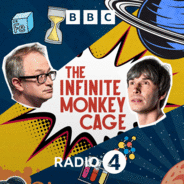
Comedy & KabarettWissenschaft & Technik
The Infinite Monkey Cage Folgen
Professor Brian Cox and Robin Ince host a witty, irreverent look at the world through scientists’ eyes. Joined by a panel of scientists, experts and celebrity science enthusiasts they investigate life, the universe and everything in between on The Infinite Monkey Cage from the BBC. From the smallest building blocks of life to the furthest stars, the curious monkeys pull apart the latest science to reveal fascinating and often bizarre insights into the world around us and what lies beyond. Can trees talk to each other? Can science help you commit the perfect murder? What might aliens look like and the burning question of our time, are strawberries alive or dead? Join them as each episode they put a different scientific topic under the microscope, from aliens, black holes and hedgehogs, to bacteria, poison and the Big Bang. With past guests including actors Dame Judi Dench and Sir Patrick Stewart, comedians Steve Martin and Conan O’Brien, astronaut Tim Peake, primatologist Jane Goodall and mathematician Hannah Fry, The Infinite Monkey Cage promises to make you laugh, enrich your knowledge and leave you with a deeper appreciation for the universe that we call home. Whether you’re a seasoned scientist or someone who nodded off in physics class, listen in to learn all about funny, fascinating and sometimes ridiculous topics – with the occasional monkey business.
Folgen von The Infinite Monkey Cage
-
Folge vom 06.07.2015The Infinite Monkey Cage USA Tour: New YorkThe Infinite Monkey Cage USA Tour: New YorkThe Infinite Monkeys return for a new series, the first of which will see them head to the USA for their first live tour. This week Brian Cox and Robin Ince can be found on stage in New York asking the question, Is Science a Force for Good Or Evil? They are joined on stage by Bill Nye the Science Guy, cosmologist Janna Levin, actor Tim Daly and comedian Lisa Lampanelli.
-
Folge vom 23.02.2015SerendipitySerendipity in ScienceBrian Cox and Robin Ince are joined on stage by comedian Lee Mack, science author and journalist Simon Singh and chemist Professor Andrea Sella to look at how many of our biggest science discoveries seem to have come about by accident. From Viagra to Pyrex to the discovery of the Cosmic Background Microwave Radiation, the earliest remnant of the big bang, they all owe their discovery to a healthy dose of luck and accident as scientists stumbled across them in the course of looking for something else. So are these discoveries just luck, are they still deserving of Nobel prizes and scientific glory, or is serendipity and an open scientific mind key to exploring and understanding our universe?
-
Folge vom 16.02.2015What Is the Point of Plants?What's the Point of Plants?Brian Cox and Robin Ince are joined on stage by plant biologist Professor Jane Langdale, physicist Professor Jim Al-Khalili and comedian and former horticulture student Ed Byrne to ask, "what's the point of plants?". How would the evolution of life on our planet have differed without plants, and what would our planet look like today? Most crucially that seemingly dull but necessary process of photosynthesis that we all learned about in school, is in fact one of the most important processes in our universe, and as usual it seems, the physicists are trying to take credit for it. Could there be a quantum explanation for how this amazing reaction works, and if so, are plants in fact the perfect quantum computers?
-
Folge vom 09.02.2015When Quantum Goes WooWhen Quantum Goes WooBrian Cox and Robin Ince are joined on stage by Bad Science author, Ben Goldacre, Professor of Particle Physics at Manchester University, Jeff Forshaw, and comedian Sara Pascoe. They'll be looking at why quantum physics, in particular, seems to attract some of the more fringe elements of pseudoscience and alternative medicine, and whether there is anything about the frankly weird quantum behaviour of particles, like the ability to seemingly be in two places at once, that really can be applied to the human condition. When spiritual healers and gurus talk about our own quantum energy and the power of quantum healing, is it simply a metaphor, or is there more to this esoteric branch of science that we could all learn from?
